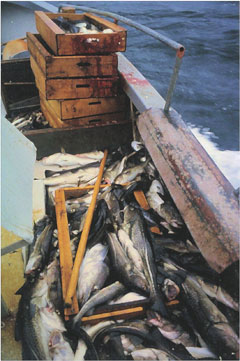Overfishing in the Baltic Sea has pushed cod to evolve for the worse
Baltic cod are shrinking due to overfishing
Jeremy Hance, mongabay.com
August 26, 2008
Cod reach adulthood earlier and are smaller in size
By comparing Neolithic cod with contemporary cod, researchers have discovered that the species has evolved over a relatively short period due to overexploitation by humans. According to a paper published in Proceedings of the Royal Society B, contemporary cod attain adulthood earlier and are generally smaller than their ancestors.
“Some fisheries, including that for cod, are now known to cause ‘juvenescence’, or the evolution of younger, smaller adult fish. The ecological and economic consequences both appear to be negative,” Dr. Karin Limburg, an ecologist at the SUNY College of Environmental Science and Forestry and one of the paper’s authors, said.
Approximately 2,500 B.C. Neolithic peoples on the island of Gotland—just off the coast of Sweden—practiced cod fishing. To determine the evolutionary differences between the ancient populations of cod and contemporary stocks, Limburg studied the earstones of these ancient dinners to gather data on the fish’s size and age.
 Cod aboard a vessel in the Baltic Sea. SUNY College of Environmental Science and Forestry |
Earstones, also called otoliths, are found in a fish’s head. They grow concentrically, much like tree rings, as fish age. Therefore, they provide invaluable data regarding the age and the size of the long-dead fish.
Ancient cod were both older and larger than their contemporaries. The Neolithic fishermen caught cod that averaged 56 centimeters (22 inches). Today the average cod is 49 centimeters (19.3 inches). Limburg says that size difference is more drastic when one considers that Neolithic fishermen worked in boats that could not move far from the coast. Fisheries today head to the Baltic’s deepest waters where the largest cod reside. Since coastal cod were over 10 percent larger 4,500 years ago than today’s deep-sea cod, one can only speculate how large ancient deep-sea cod were.
“The big concern is that overexploitation is causing the fish to evolve.” Limburg said “The finding that humans can actually cause evolution of fish populations, which in turn can drive their degradation, is relatively new and is drawing a lot of attention.”
“Dire” is how Limburg described today’s cod fishery in the Baltic Sea. The cod fishery focuses on old females, because they are the largest. Yet older females produce more eggs than young ones, and are therefore vital to population recovery.
WWF has predicted that if cod fisheries around the world continue business-as-usual there will be no cod left to fish by 2022.














